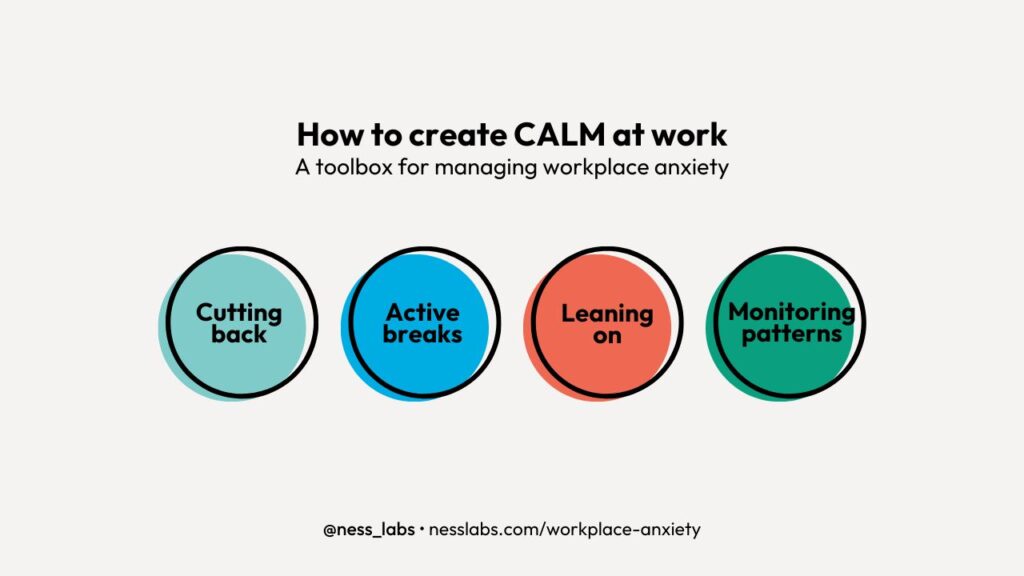Whether it’s racing to meet a tight deadline or dealing with difficult clients, there are many reasons why you may feel anxious at work. Considering that most of us spend the majority of our waking hours at work—whether in the office or remotely—learning how to manage workplace anxiety is crucial for maintaining good mental health.
While a little anxiety can sometimes help sharpen your focus, chronic workplace anxiety not only undermines your performance but can also spill over into your personal life, damaging your relationships and eroding your well-being.
Workplace anxiety is more common than you might think, yet it often goes unspoken. The problem is, it’s a hidden struggle. People won’t talk about it.
In a professional setting, where we’re expected to perform at our best, acknowledging feelings of anxiety can feel like admitting a weakness. That’s why a survey revealed that 38% of individuals with an anxiety disorder choose not to disclose it to their employers, fearing that “their boss would interpret it as lack of interest or unwillingness to do the activity.”
But, but—I hear you say—you actually enjoy your job. It’s intellectually stimulating and your team is great. And yet, somehow, you often feel that tightness in your chest or a sense of restlessness. So, what’s going on exactly, and what can you do about it?
Why we feel anxious at work
Even when you enjoy your job, anxiety can still arise due to various underlying reasons that aren’t related to job satisfaction. In fact, one of the most common causes of workplace anxiety is high expectations and pressure.
Research shows that we often set high standards for our own performance, especially in jobs we are passionate about. This can lead to a fear of underperforming or not meeting those standards, which in turn triggers anxiety. This can lead to burnout when you constantly feel the need to “prove yourself” and stress accumulates.
Another contributing factor is the uncertainty of modern work environments. We have a natural aversion to uncertainty, and workplaces often come with plenty of it—whether it’s about shifting project goals, organizational changes, or unpredictable feedback. Even if you love what you do, the unpredictability of what comes next can create anxiety.
Lastly, many people who are highly invested in their careers struggle to separate work from their personal life, which can create anxiety when those boundaries blur. Remote work, which has benefits for flexibility, can actually make it harder to switch off from work mode, intensifying feelings of overwhelm. Because it’s hard to fully relax, you end up often feeling anxious for no apparent reason—a phenomenon psychologists call free-floating anxiety.
How to stay CALM at work
Telling yourself to stop being anxious when you’re stressed is similar to telling yourself to fall asleep when you have insomnia—it simply doesn’t work. So what does?
Here are some evidence-based tips you can use next time you feel anxious at work. I call it the CALM toolbox, and it includes cutting back, active breaks, leaning on, and monitoring patterns:

- Cutting back. Before you consider more involved interventions, consider the possibility that your heart might be beating extra fast because you had too much coffee or energy drinks. Caffeine can produce the exact same effects as anxiety, to a point where researchers cannot tell apart anxiety from caffeinism with complete certainty. Plus, if you’re feeling stressed already, caffeine can exacerbate the symptoms of anxiety. So switch to decaffeinated drinks or herbal infusions.
- Active breaks. We tend to deal with anxiety at work by powering through and trying to get as much as possible done to alleviate the stress, but stepping away from your computer can be a great way to reduce your anxiety. There’s also lots of research showing the positive impact exercise has on our mental health in general, and in particular on anxiety. Going for a quick run can be a great fix.
- Leaning on. Anxiety can lead to lots of rumination, which is basically repetitive thinking about the causes, factors, and consequences of a negative emotional experience. Talking to someone can break that loop by getting novel input and creating new ways of thinking. Reach out to a trusted colleague or, if you have a good relationship, let your manager know you’re struggling.
- Monitoring patterns. Make space for self-reflection by incorporating a metacognitive practice in your routine, such as journaling or a weekly review. If you notice any recurring patterns and triggers, consider what changes are necessary and how you can implement them to avoid workplace anxiety becoming your daily reality.
While many uncontrollable factors in your work environment can make occasional anxiety inevitable, you can apply the strategies to manage your anxiety in a healthier, more sustainable way. Accepting your anxiety and dealing with it with self-kindness and curiosity are the first steps in feeling more relaxed at work.
